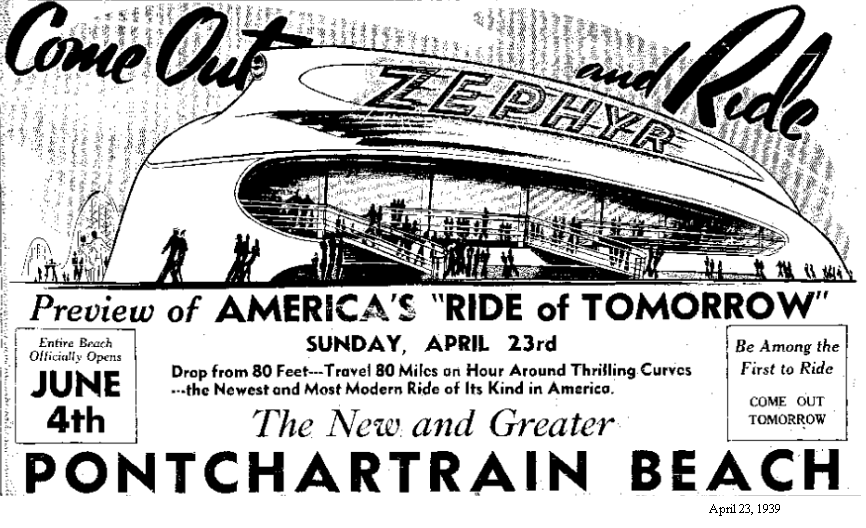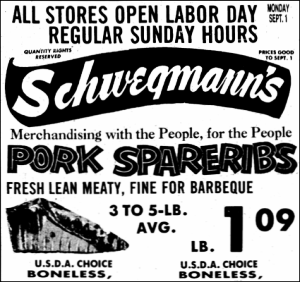Mayor Moon
Landrieu and Family at Gallier Hall
Carnival
Day, February 23, 1971
Photo
from the New Orleans Public Library (photographer unknown).
Mayor
Moon Landrieu at Gallier Hall on Mardi Gras Day, February 23, 1971. Mrs. Verna Landrieu is standing next
to him. The Landrieu children (left to right) are Madeleine (now a judge in Civil District Court), Melanie, Martin, and
Maurice.
Carnival Day was celebrated on February 23, 1971, 1982, and 1993.
You Can Support this Site by Clicking on & Shopping from this Amazon Link -- and it
won't cost you a penny more:


On February 23, 1934, Huey P. Long, then a Senator, former Governor and self proclaimed
"King Fish" bought air time for a national radio broadcast to spread his "Share Our Wealth" ideology--to
make "Everyman a King". Long was gearing up for a probable run in the 1936 presidential election.
The Poydras Homestead Association, one of thirty-six such firms listed in the 1911 Soards' New Orleans
Trade Guide, had its office at 520 South Rampart Street. In 1911 its president was Salvador Bennett and Maurice F. O'Neill
acted as secretary and treasurer. The firm's board meeting minutes begin on February 23, 1910 with
what appears to be the firm's organizational meeting.
New Orleans first iIlluminated Carnival
Bicycle Parade was held on February 23, 1887.
John T. Monroe was elected the sixteenth Mayor of New Orleans on June 4, 1880 and served until May 16,
1862, being the Mayor at the time of the outbreak of the wara between the States. He died on February 23, 1871.
Records for the Girls' House of Refuge date back at least to February 23, 1854, when municipal ordinance
#1340 authorized the purchase of a building for such purposes.
The City of New Orleans absorbed the City of Lafayette via an Act of the Legislature dated
February 23, 1852. This addition became the Fourth District.
Page Mercer Baker, journalist. Born, Pensacola, Fla., February 23, 1840; son of James
McCutcheon Baker of Pennsylvania, a naval veteran of the War of 1812 and the Mexican War, and Ann Eliza Mercer of Baltimore.
Education: local schools. Removed to New Orleans, 1858; traveling salesman for hardware firm, McCutcheon, Howell &
Co. Civil War service: volunteered, 1861; served in Virginia; transferred to Washington Artillery. Spent last year of
war in Confederate Navy, assigned to the ironclad Tuscaloosa. After war, returned to New Orleans and engaged in many business
pursuits, including insurance. Entered the field of journalism, 1868, largely owing to influence of elder brother, Marion,
then city editor of the Daily Picayune. As a reporter, became active in the struggle to free the state from Radical rule.
In 1870 was one of the committee of 100 Louisianians who went to Washington, D. C., to protest to President Grant the military
policy being pursued by the federal government in Louisiana. In 1872, one of several individuals who founded the New Orleans
Herald, a short-lived venture. Shortly thereafter, joined with Dan Byerly to establish the New Orleans Bulletin, which is
alleged to have fostered the organization of the White League, leading to the riot of September 14, 1874. Soon after, subject
retired from journalism because of ill health and death of his partner. Reentered journalism, 1880, as managing editor
of the New Orleans Times, and continued to serve in that capacity after consolidation of the Times and the New Orleans Democrat
in 1881. Continued as editor and manager of the Times-Democrat until death, bringing the paper to the zenith of its success.
Always encouraged young writers, including Lafcadio Hearn (q.v.), who dedicated his first book to subject. Originated the
Doll and Toy Fund later continued by the Times-Picayune. Married (1) Constance Fell (d. 1889), of New Orleans, daughter
of Peter B. Fell. Married (2) Mary Fell, sister of first wife. One child, Constance. Died, New Orleans, May 28, 1910;
interred Metairie Cemetery. G.R.C. Sources: New Orleans Daily Picayune, May 29, 1910; Fayette Copeland, "The New
Orleans Press and the Reconstruction," Louisiana Historical Quarterly, XXX (1947); New Orleans Times-Picayune, January
25, 1937. From http://lahistory.org/site19.php
An act of sale or transfer of rights between Bernard Marigny and the Ponchartrain Railroad Company
was signed on February 23, 1830.
Jean-Baptiste Le Moyne de Bienville, French explorer, administrator, governor. Born, Montreal,
Canada, February 23, 1680; eighth of eleven sons of Charles Le Moyne and Catherine Tierry (Primot).
Spent youth on the family's extensive Canadian holdings, and later joined elder brother, Iberville (q.v.), in the king's
service on the expedition of settlement that arrived in Louisiana in 1699. Explored the lower Mississippi and was instrumental
in establishing settlements on the Gulf Coast and the Mississippi, including New Orleans. Served in Louisiana as commandant
and was governor between 1701-1713, 1718-1724, and 1733-1743. These years of colonial service brought him few rewards
and insurmountable problems that included: the indifference of the home government; the colony's constant drain on
the French treasury; the dearth of population; the dual system of government that pitted governor against commissaire and
ensnarled the colony's government; and a protracted series of Indian wars. He requested retirement in 1740 and returned
to France in 1743. Died, Paris, March 7, 1768. C.E.D. Sources: Grace King, Jean-Baptiste Le Moyne,
Sieur de Bienville (1892); Glenn R. Conrad, ed., Readings in Louisiana History (1978); Charles E. O'Neill, "Jean-Baptiste
Le Moyne de Bienville," Dictionnaire Biographique du Canada, III; Charles E. O'Neill, "The Death of Bienville,"
Louisiana History, VIII From http://lahistory.org/site19.php









